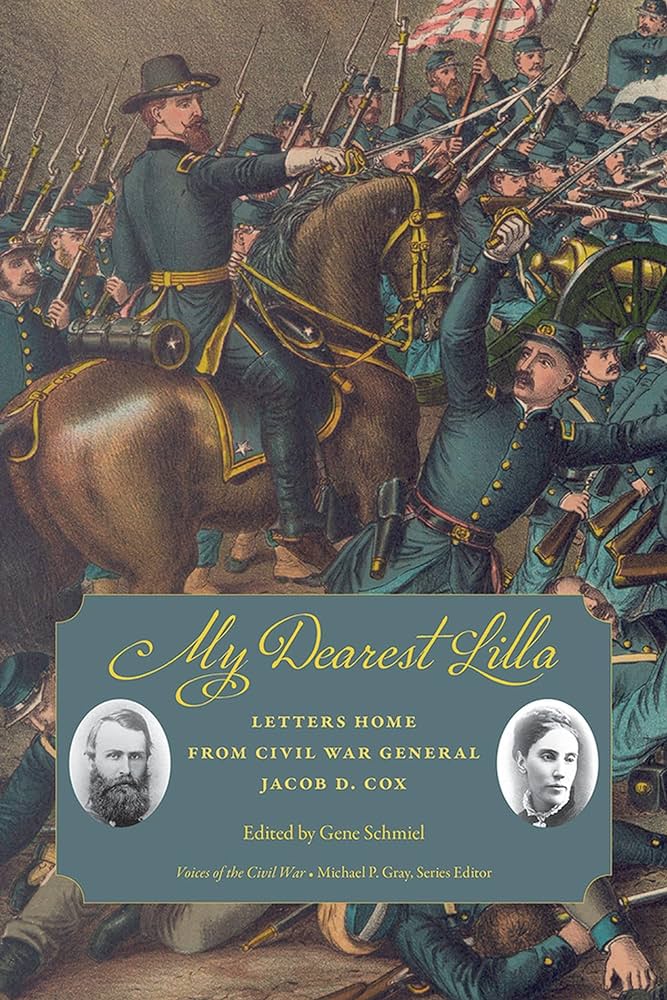Book Review: My Dearest Lilla: Letters Home From Civil War General Jacob D. Cox

 My Dearest Lilla: Letters Home From Civil War General Jacob D. Cox. Edited by Gene Schmiel. Knoxville, TN: The University of Tennessee Press, 2023. Paperback, 260 pp. $ 34.95.
My Dearest Lilla: Letters Home From Civil War General Jacob D. Cox. Edited by Gene Schmiel. Knoxville, TN: The University of Tennessee Press, 2023. Paperback, 260 pp. $ 34.95.
Reviewed by Joseph D. Ricci
Over the last decade, Gene Schmiel has contributed greatly to the understanding of one of the Civil War’s most overlooked figures, U.S. Army Maj. Gen. Jacob D. Cox. My Dearest Lilla, the latest addition to Schmiel’s catalog of works pertaining to Cox, peels back yet another layer to one of the war’s most fascinating participants. Throughout his life Cox was a student, soldier, statesman, educator, scientist, writer, historian, but above all, a deeply devoted husband to his beloved Helen, or “Lilla” as he referred to her. Schmiel’s selection of letters shows a deep complexity to Cox’s military career but also his incredible transformation from quiet civilian to citizen soldier.
Building off Schmiel’s earlier work on Cox, Citizen General, My Dearest Lilla completes a full narrative about one of the Civil War’s most underappreciated soldiers. Cox, like so many others of his time, spent countless hours writing letters. These letters, so carefully commented on by Schmiel, provide valuable insight into Cox’s military thoughts but also show him as a human being with strong emotions, deep thoughts, and incredible introspection. As a soldier, Cox could be scathing in his criticism of superiors, such as Gen. George McClellan. While critical of McClellan, Cox lauded Maj. Gen. William T. Sherman’s leadership in the campaign to capture Atlanta in 1864. His growth as a soldier is also perfectly captured through his letters and through Schmiel’s well-informed commentary that accompanies each chapter and a variety of personal correspondence.
In the early days of the war, Cox, like so many other men saw the conflict as something of an adventure. In May 1861, Cox wrote home to Helen, “I am hearty and healthy and browning like a berry…and really believe the outdoor life will give me strength & be of lasting service to me” (1). By 1864, in the throes of the Tennessee Campaign of 1864, the soldier who trained at Camp Dennison, marched off to war in the Kanawha region of the western Virginia foothills, saw active combat at Antietam, heavy campaigning in East Tennessee, and prolonged duty in the fighting around Atlanta, had been transformed by war. On November 30, 1864, Cox commanded the Federal Army tasked with holding the south side of Franklin, Tennessee, as Gen. John Schofield hastened to cross the Harpeth River. At 4:00 PM, Confederate Gen. John Bell Hood launched an assault against Cox’s defensive positions. Of his part in the Federal victory Cox wrote, “The enemy came on in magnificent style…I exerted myself…I have never seen fighting continue so late…I fully expected to be hit, but as before Providence willed it otherwise & I was unscathed” (206).
With the war finished, Cox returned home to Ohio and became one of the state’s most prominent politicians. A liberal Republican, he served as the governor and later was appointed to President Ulysses S. Grant’s cabinet. Withdrawn from public service, Cox became an academic and one of the Civil War’s earliest writers and historians. In his volumes, Cox recounted the battles and great controversies of the war. These writings were greatly aided by the letters shared between he and his wife. With twenty years removed from the events of the war, he and Helen’s letters were the earliest, most reliable sources he could turn to for his own personal thoughts.
He and Helen remained married for fifty-two years by his death in 1900.
With My Dearest Lilla Gene Schmiel profiles the intimacies of Cox’s war, his growth as a soldier, his and Helen’s incredible relationship, and the journey of the two of them into the earliest foundations of Civil War Memory.
A native of New Orleans, Joseph D. Ricci, serves as the Historian for the Battle of Franklin Trust. Joseph holds a Master’s Degree in History from Southeastern Louisiana University. Joseph’s fascination with history stems from his early years of involvement with, and travel to, various museums and battlefields connected the American Civil War and the Second World War. For the last two years, he has written extensively for the Dispatch Magazine, produced the Dispatch Podcast, appeared in several BOFT Films productions, in addition to leading tours of the three historic homes and the surrounding battlefields. Joseph is a frequent speaker to Civil War Round Tables and has been a guest on several podcasts, Additionally, he has contributed essays published in the Emerging Civil War Series, and is the producer and host of Home Brew History Podcast which is available on all podcast platforms. In his free time, Joseph enjoys spending time and traveling with his wife, Katharyn, and daughter, Hattie.
I saw an ad for this in the latest Civil War Monitor.